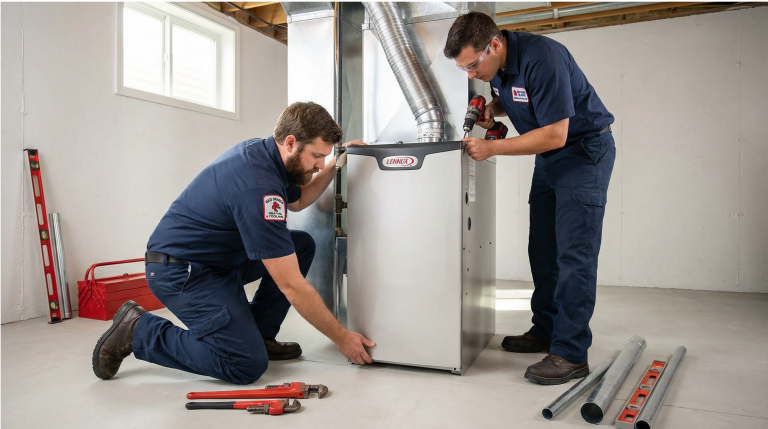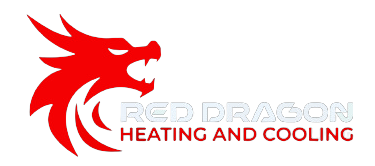- 518.348.9000
- [email protected]
- 117 Van Rd Gloversville,NY 12078
Your Ultimate Guide to New Furnace Installation in Fulton and Montgomery Counties with Red Dragon Heating and Cooling
As the seasons turn in Upstate New York, and the picturesque landscapes of Gloversville, Johnstown, Broadalbin, Mayfield, Fonda, Amsterdam, and Northville are painted with the vibrant colors of autumn, the impending chill of winter is a stark reminder of the importance of a reliable heating system. A furnace is the heart of your home during the cold months, providing essential warmth and comfort. If your current furnace is old, inefficient, or unreliable, it may be time to consider a new furnace installation. At Red Dragon Heating and Cooling, we are the leading experts in new furnace installation in Fulton and Montgomery Counties, and we’ve created this comprehensive guide to help you navigate the process.

Is it Time for a New Furnace? Signs to Look For
Deciding to replace your furnace is a significant investment, and it’s important to know when the time is right. Here are some of the key signs that indicate it may be time for a new furnace installation:
- Age of Your Furnace: The average lifespan of a furnace is 15-20 years. If your furnace is approaching this age, it’s a good idea to start planning for a replacement, even if it’s still working. An older furnace is more likely to break down and is significantly less efficient than a modern unit.
- Rising Energy Bills: If you’ve noticed a steady increase in your energy bills, it could be a sign that your furnace is losing its efficiency. An old or poorly maintained furnace has to work harder to heat your home, which means it consumes more fuel.
- Frequent Repairs: Are you on a first-name basis with your HVAC technician? If you’ve had to call for frequent repairs in the last couple of years, it may be more cost-effective to invest in a new furnace rather than continuing to pour money into an old, unreliable unit.
- Uneven Heating: Are some rooms in your home warm and cozy while others are cold and drafty? This could be a sign that your furnace is no longer able to distribute heat evenly throughout your home.
- Strange Noises: A healthy furnace should operate relatively quietly. If you’ve started to hear strange noises, such as rattling, popping, or humming, it could be a sign of a serious problem.
- Visible Signs of Rust or Cracks: If you can see rust or cracks on your furnace, it’s a clear sign that it’s time for a replacement. A cracked heat exchanger is a particularly serious issue, as it can leak carbon monoxide into your home.
- Yellow Burner Flame: The burner flame on your furnace should be blue. A yellow flame could indicate that the furnace is not burning fuel efficiently and could be producing carbon monoxide.
If you’ve noticed any of these signs, it’s a good idea to have your furnace inspected by a professional. At Red Dragon Heating and Cooling, we can provide you with an honest assessment of your furnace’s condition and help you determine if a new installation is the right choice for you.
Choosing the Right Furnace for Your Home
Once you’ve decided to invest in a new furnace, the next step is to choose the right one for your home. There are several factors to consider, including the type of fuel, the efficiency rating, and the size of the furnace.
Fuel Type
- Natural Gas: Natural gas is the most common type of fuel for furnaces in our area. It’s typically the most affordable option and is piped directly to your home, so you don’t have to worry about running out of fuel.
- Propane: If natural gas is not available in your area, propane is a good alternative. It’s a clean-burning fuel that is stored in a tank on your property.
- Oil: Oil furnaces are less common than they used to be, but they are still a viable option in some areas. Oil is also stored in a tank on your property.
- Electric: Electric furnaces are the most expensive to operate, but they are also the most efficient. They are a good option for homes that do not have access to natural gas or propane.
Efficiency Rating (AFUE)
The efficiency of a furnace is measured by its Annual Fuel Utilization Efficiency (AFUE) rating. The AFUE rating represents the percentage of fuel that is converted to heat. For example, a furnace with an AFUE rating of 95% converts 95% of the fuel it consumes to heat, while the other 5% is lost through the chimney. The higher the AFUE rating, the more efficient the furnace. Modern furnaces have AFUE ratings of up to 98.5%, which can translate to significant savings on your energy bills.
Size of the Furnace
It’s crucial to choose a furnace that is the right size for your home. A furnace that is too small will struggle to heat your home, while a furnace that is too large will cycle on and off too frequently, which can lead to uneven heating and unnecessary wear and tear on the components. At Red Dragon Heating and Cooling, we will perform a thorough load calculation to determine the right size furnace for your home.
The Red Dragon New Furnace Installation Process
At Red Dragon Heating and Cooling, we are committed to providing a professional and seamless new furnace installation experience. Here’s what you can expect when you choose us for your new furnace installation:
- Free In-Home Consultation: We’ll start with a free in-home consultation to assess your heating needs and help you choose the right furnace for your home and budget.
- Professional Installation: Our certified and experienced technicians will install your new furnace according to the manufacturer’s specifications and local building codes. We’ll take care to protect your home during the installation process and will clean up our work area when we’re finished.
- System Testing and Calibration: Once the installation is complete, we’ll test your new furnace to make sure it’s operating safely and efficiently. We’ll also calibrate the thermostat to ensure accurate temperature control.
- Customer Education: We’ll take the time to show you how to operate your new furnace and will answer any questions you may have.
- Follow-Up and Support: We’re here for you even after the installation is complete. We offer comprehensive maintenance plans to keep your new furnace in optimal condition, and we’re always available to answer your questions and provide support.
Serving Our Communities: New Furnace Installation Across Fulton and Montgomery Counties
Red Dragon Heating and Cooling is proud to serve the communities of Fulton and Montgomery Counties. We understand the unique needs of each community and are committed to providing the best possible service to our neighbors.
Gloversville and Johnstown: The Heart of Our Service Area
As our primary service areas, Gloversville and Johnstown are at the heart of our business. We are dedicated to providing the residents of these historic cities with the best possible new furnace installation services. We have extensive experience working in the old, historic homes that are so common in this area, and we understand the unique challenges they can present. Whether you live in a historic home near the Gloversville Public Library or a newer construction near the Johnson Hall State Historic Site, we can provide you with a new furnace that will keep you warm and comfortable for years to come.
Broadalbin: Historic Charm and Modern Comfort
Broadalbin is a community that beautifully blends historic charm with modern comfort. We are proud to provide new furnace installation services to the residents of this beautiful town. We have experience working in both historic homes, such as those near the Historic Hotel Broadalbin, and modern constructions. We can help you choose a new furnace that will meet the unique needs of your home and will provide you with reliable and efficient heat for years to come. After a day of enjoying the Broadalbin Town Park or the Sacandaga Marine Access, you can return to a warm and cozy home, thanks to your new furnace from Red Dragon Heating and Cooling.
Mayfield: Lakeside Living and Cozy Homes
Mayfield is a community that is defined by its beautiful natural surroundings, from the Great Sacandaga Lake to the Adirondack Park Foothills. The residents of Mayfield need a reliable heating system to keep them warm during the cold winter months. We are proud to provide new furnace installation services to the residents of Mayfield. We can help you choose a new furnace that is the right size for your home and that will provide you with efficient and reliable heat. We also have experience working in the many historic homes in the area, including those near the Mayfield Historical Society.
Fonda: A Rich History and a Bright Future
Fonda is a village with a rich history and a strong sense of community. We are proud to provide new furnace installation services to the residents of Fonda. We understand the importance of a reliable heating system in the historic homes and buildings that are so common in this area, and we have the experience and expertise to provide a professional and seamless installation. Whether you live in a historic home near the Old Montgomery County Courthouse or a newer construction, we can provide you with a new furnace that will keep you warm and comfortable for years to come.
Amsterdam: A Diverse City with Diverse Needs
Amsterdam is a vibrant city with a diverse housing stock, from historic homes near the Amsterdam Castle to modern constructions in the surrounding suburbs. This diversity means that the heating needs of Amsterdam residents can vary greatly. At Red Dragon Heating and Cooling, we have the experience and expertise to install all types of furnaces, from old to new. We can help you choose a new furnace that is the right size and type for your home and that will provide you with efficient and reliable heat. After a walk along the Mohawk Valley Gateway Overlook or a visit to the Walter Elwood Museum, you can rest assured that you’ll have a warm and cozy home to return to.
Northville: Gateway to the Adirondacks
Northville is a charming village that serves as the gateway to the Adirondack Park. The residents of Northville are no strangers to cold winters, and they know the importance of a reliable heating system. We are proud to provide new furnace installation services to the residents of Northville. We can help you choose a new furnace that is up to the challenge of a Northville winter. Whether you’re an avid hiker of the Northville-Placid Trail or you simply enjoy the beauty of Waterfront Park, you can count on Red Dragon Heating and Cooling to keep your home warm and comfortable.
Conclusion: Your Partner in Home Comfort
Investing in a new furnace is a significant decision, but it’s one that can pay off in the long run with lower energy bills, improved comfort, and increased home value. At Red Dragon Heating and Cooling, we are committed to providing the best possible new furnace installation experience. We are your partners in home comfort, and we are dedicated to ensuring that your home is always a warm and welcoming retreat. Contact us today to schedule your free in-home consultation and take the first step towards a warmer and more comfortable home.
Understanding Furnace Technology: What's New and What's Next
The world of furnace technology has evolved significantly in recent years. Modern furnaces are more efficient, more reliable, and more environmentally friendly than ever before. Here are some of the latest advancements in furnace technology:
- Modulating Furnaces: Unlike traditional single-stage furnaces that operate at full capacity or not at all, modulating furnaces can adjust their output to match the heating demand. This results in more consistent temperatures, improved comfort, and significant energy savings.
- Variable-Speed Blowers: Traditional furnaces use single-speed blowers that operate at full speed whenever the furnace is running. Variable-speed blowers, on the other hand, can adjust their speed to match the heating demand, which results in quieter operation, improved comfort, and better energy efficiency.
- Smart Thermostats: Modern furnaces can be paired with smart thermostats that allow you to control your heating system from your smartphone or tablet. Smart thermostats can also learn your heating preferences and can automatically adjust the temperature to maximize comfort and energy savings.
- Sealed Combustion: Sealed combustion furnaces draw combustion air from outside the home, rather than from inside. This improves efficiency and indoor air quality.
Financing Your New Furnace Installation
We understand that a new furnace is a significant investment. That’s why Red Dragon Heating and Cooling offers flexible financing options to help make your new furnace more affordable. We work with a variety of lenders to offer competitive rates and terms, and we can help you find a financing option that fits your budget. Don’t let the cost of a new furnace prevent you from enjoying the comfort and energy savings that a modern, high-efficiency furnace can provide.
The Importance of Proper Sizing
One of the most critical factors in the success of your new furnace installation is proper sizing. A furnace that is too small will struggle to heat your home, especially on the coldest days of the year. A furnace that is too large, on the other hand, will cycle on and off too frequently, which can lead to uneven heating, reduced efficiency, and premature wear and tear on the components.
At Red Dragon Heating and Cooling, we use industry-standard load calculation methods to determine the exact size furnace your home needs. We take into account a variety of factors, including the size of your home, the amount of insulation, the number and size of windows, the climate in your area, and more. This ensures that your new furnace is perfectly sized for your home and will provide you with optimal comfort and efficiency.
What to Do With Your Old Furnace
When you have a new furnace installed, you’ll need to dispose of your old furnace. At Red Dragon Heating and Cooling, we will handle the removal and disposal of your old furnace for you. We will ensure that it is disposed of in an environmentally responsible manner, in accordance with all local regulations. You don’t have to worry about a thing—we’ll take care of everything for you.
Rebates and Incentives for High-Efficiency Furnaces
In many cases, you may be eligible for rebates and incentives when you install a high-efficiency furnace. These rebates and incentives can help to offset the cost of your new furnace and can make it even more affordable. At Red Dragon Heating and Cooling, we can help you to identify and apply for any available rebates and incentives. We’ll make the process as easy as possible for you.
The Role of Ductwork in Furnace Performance
Your furnace is only as good as the ductwork that distributes the heated air throughout your home. If your ductwork is old, leaky, or poorly designed, it can significantly reduce the efficiency and performance of your new furnace. When you have a new furnace installed, it’s a good idea to have your ductwork inspected and, if necessary, repaired or replaced. At Red Dragon Heating and Cooling, we can provide you with a comprehensive ductwork inspection and can make recommendations for any necessary repairs or improvements.
Maintaining Your New Furnace
Once your new furnace is installed, it’s important to maintain it properly to ensure that it continues to operate efficiently and reliably for years to come. At Red Dragon Heating and Cooling, we offer comprehensive maintenance plans that include annual furnace maintenance, priority scheduling, discounts on repairs, and much more. By investing in a maintenance plan, you can protect your investment and can ensure that your new furnace is always in optimal condition.
Frequently Asked Questions About New Furnace Installation
Q: How long does a new furnace installation take?
A: A typical new furnace installation takes one to two days, depending on the complexity of the installation and whether any modifications to the ductwork or other components are necessary.
Q: Will I need to be home during the installation?
A: Yes, we recommend that you be home during the installation so that our technicians can answer any questions you may have and can show you how to operate your new furnace.
Q: What kind of warranty comes with a new furnace?
A: Most new furnaces come with a manufacturer’s warranty that covers parts and labor for a specified period of time. The length and terms of the warranty vary depending on the manufacturer and the model of the furnace. We’ll provide you with all of the warranty information when we install your new furnace.
Q: Can I install a new furnace myself?
A: We strongly recommend that you have your new furnace installed by a qualified professional. Furnace installation is a complex process that requires specialized knowledge and skills. An improperly installed furnace can be dangerous and can void the manufacturer’s warranty.
Q: How can I maximize the efficiency of my new furnace?
A: There are several things you can do to maximize the efficiency of your new furnace, including having it maintained annually, changing the air filter regularly, sealing any leaks in your ductwork, and upgrading to a programmable or smart thermostat.
The Red Dragon Promise
At Red Dragon Heating and Cooling, we stand behind our work. We are committed to providing you with the highest quality products and services, and we will do everything we can to ensure your complete satisfaction. If you’re not happy with our work, we’ll make it right. That’s the Red Dragon promise.
Take the First Step Towards a Warmer, More Comfortable Home
If you’re ready to invest in a new furnace, contact Red Dragon Heating and Cooling today to schedule your free in-home consultation. We’ll assess your heating needs, help you choose the right furnace for your home and budget, and provide you with a detailed estimate. We look forward to helping you take the first step towards a warmer, more comfortable, and more energy-efficient home.
WHAT WE DO
Expert HVAC Care, Always.


Residential Installations
Trust us to transform your space into a haven of perfect climate control with our expert HVAC installations.

Commercial Installations
Trust us to transform your space into a haven of perfect climate control with our expert HVAC installations.

Thermostat Installations
Trust us to transform your space into a haven of perfect climate control with our expert HVAC installations.

Air Quality Solutions
Trust us to transform your space into a haven of perfect climate control with our expert HVAC installations.
